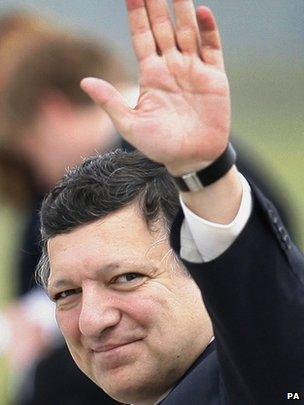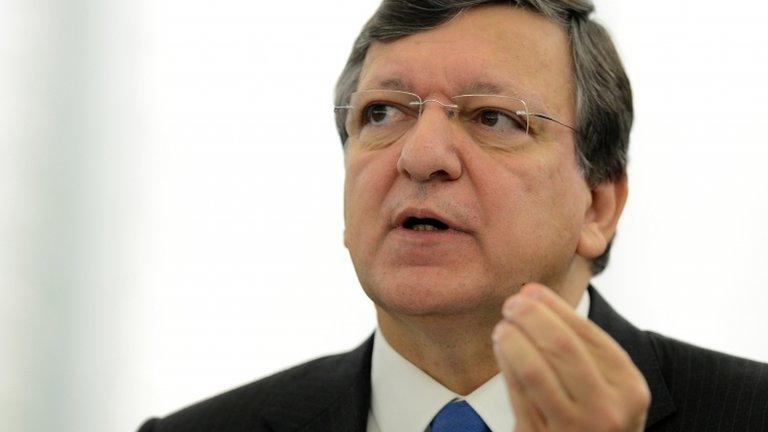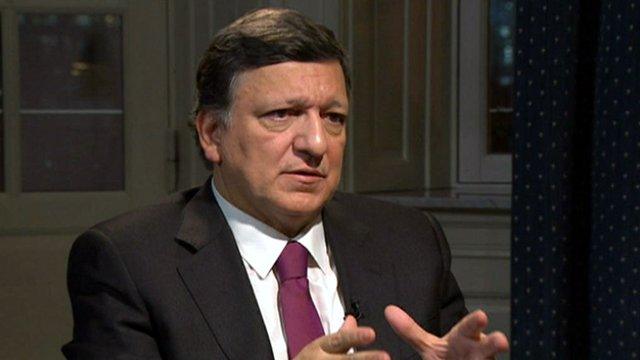Belief and politics
- Published

Jose Manuel Barroso spoke to the BBC about new states and EU membership
In the BBC interview, Jose Manuel Barroso looks ever so slightly uncomfortable - even perhaps faintly exasperated at being asked again to clarify the position with regard to an independent Scotland and the European Union.
However, there is little doubt as to the import of his remarks. While stressing that he is making no comment upon individual situations, he says that a country becoming independent is a new state and as such has to apply for membership and negotiate terms.
Such would not apply to the remainder of the UK which would be a continuing state - and member.
In response, it might be said that the President of the European Commission is not the sole arbiter, that he does not have the final word, that a political deal among members of the European Council might shortcut any such process.
However, his opinion is, at the very minimum, interesting and influential. Taken to the maximum, it represents arguably a substantive challenge to the SNP position.
To be clear, the position of the SNP has long been that there would have to be negotiations, if only to sort out such basic matters as the number of MEPs to be sent by an independent Scotland to Brussels - and, via the peripatetic Parliament, to Strasbourg.
But Nationalists have insisted that an independent Scotland would start out within the EU - and would conclude the process in the same place. They depict these talks as amicable discussions among colleagues - rather than an external bid by a newcomer.
Talking privately to senior figures on both sides, I find very few - if any - who envisage that Scotland, post independence, would not ultimately retain EU membership. At issue is the timescale - and the terms.
Would Scotland, for example, have to adopt the Euro?
Yes, say Unionists: those are the rules for new members.
No, say Nationalists: look at Sweden which has not joined the Euro and does not look like doing so any time soon.
Alex Salmond's opponents will be content, again at minimum, that they are able to depict the EU issue as an element of uncertainty attaching to the independence debate. They are already listing the benefits of membership which, they argue, are now in question.

The Scottish government believes an independent Scotland would remain in the EU
To restate the basics (see previous postings), Scotland would not be out of the EU on the day following a Yes vote in a referendum. At that point, on that day, Scotland would still be part of the United Kingdom and, as such, attached to the European Union. Scots would be EU citizens.
Indeed, Scotland's overall status would only be transformed with the passage of an Act at Westminster repealing the 1707 Treaty of Union and declaring Scottish independence.
This would follow negotiations on such matters as debt and assets between Edinburgh and London.
It is the SNP's contention that this process might take around two years, allowing the Holyrood elections in 2016 to be elections to an independent parliament.
The presumption is that negotiations would also be taking place, in parallel, regarding EU membership. Nationalists cite paragraph 30 of the Edinburgh Agreement as evidence that the UK would assist in that process.
Are we welcome?
Unionists dispute that, saying that section 30 merely means that both sides commit to accepting the outcome of the referendum. That does not mean, they say, that the UK government would have to strain every sinew to address problems which, they might contend, have been created by the Scottish government's drive for independence.
That Nationalists, in short, cannot expect that every problem is automatically removed by a single vote.
So where are we? Where we always were: back with politics - and belief.
Do you believe that there would be substantial obstacles in the path of continuing EU membership, derived from necessary process and, perhaps, political disquiet about independence among other member states?
Or do you believe that Scotland - with her oil, fish and renewable energy - would be welcomed within the EU?
- Published10 December 2012

- Published10 December 2012
